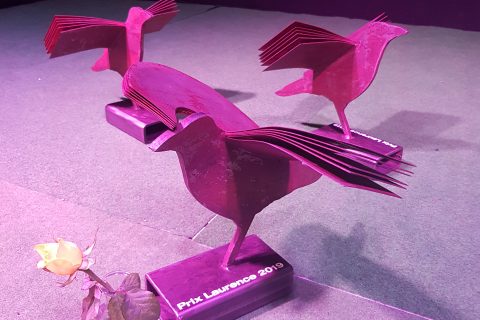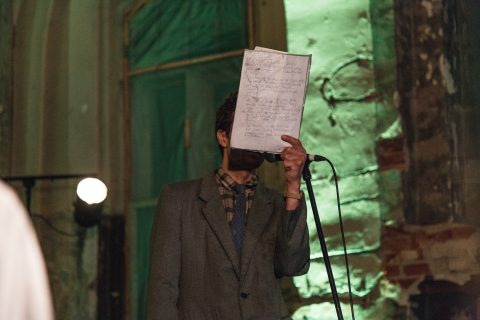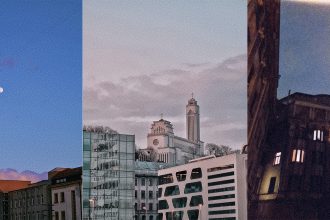The author was awarded the literary One Litas Prize for the poetic look and attention to those who find themselves on the margins of society in the collection of poems People (Žmonės) in 2020 by Kaunas writers. At the Druskininkai Poetic Fall, People received Žemaitė’s Purse Award, and this April, Enrika Striogaitė’s poetry book won the book of the year 2020 in the Book of the Year Awards (poetry category).
Thus, it would have been strange if the poet would not have been invited to the first Kaunas Literature Week, where she and Indrė Valantinaitė will take part in a conversation with Ramūnas Čičelis. It would be unusual if I didn’t see – at least out of the corner of my eye – E. Striogaitė at one or another cultural event, after which a review or reflection may or may not be born. Kaunas would be peculiar without the thoughts of this poet, which relatively sparingly appear on bookshelves. Although, the city is already bizarre on its own accord.

This is what I read in one of your recent interviews, “I wasn’t going to publish a book because there are plenty of them, good ones too.” How much do you read or follow the changing Lithuanian literature, including poetry? Do you spare time to look for it or do you trust publishers and editors?
I don’t trust publishers or editors, I trust people, whose opinions I trust, also I follow my intuition. I don’t know how or how much I read – I don’t keep track – but it seems that I know the things that are important to me.
Continuing with the first thought, there really is an abundance of books and it oftentimes feels oppressive, even physically. Was it because of the mechanical nature of the big publishing houses, as well as pompousness and the thickness of paper that you chose to publish and distribute the People yourself? Or it is just an accidental situation that worked out well? Perhaps in the traditional publishing framework, People would be hidden behind other people, names, and faces.
This was a deliberate choice, a king of rebellion. In fact, it was precisely due to the lack of the traditional publishing frame that it was speculated that the book would go unnoticed, hide behind other people, names, faces. On the other hand, it somehow happened on its own, with no support, since I’m incapable of making curtsies to important people. And now, I think it’s only natural that those people of mine, the book People, came out on its own and can be moved without the need of any green light. It wasn’t easy and now, I am not sure I would have the courage. Perhaps that intention not to publish a book led to this risk without the worry that it might stay unpublished or go unnoticed. But I must admit, there was quite a lot of rebellion involved.
What did poet Enrika Striogaitė, or simply Enrika, did during these fourteen years, after the publishing of her previous poetry collection It Is getting Lonely (Vienišėja)? Did you write for yourself (although I did read your work in Metai) or simply observe people?
The poems published in Metai were from People. The same year, when the publication appeared, the book’s draft for publication was rejected. I wasn’t writing for myself; I wrote very little in general, and what I did write, I didn’t save because I wasn’t really going to publish a book. I was attracted to unwritten poems, their intangible substance. They are the most real, the purest, and you have to write a lot of them in order to move on to the unwritten ones. However, I wanted to write down one of them, but I couldn’t manage to do that in 20 years. In fact, I didn’t have to try either and, by the way, I wasn’t really trying. But still, I was interested in the other side of alchemy: can at least one of the unwritten ones be written down without losing it.
By the way, the last poem of the second book It Is Getting Lonely, published 14 years ago, is called “Unwritten Poems.” It seems natural that I was silent for a while.
Wherever I go
the unwritten poems
miaow in the voices of buried kittens
sometimes I dig one up,
give it some milk,
we have a cozy evening.
Then I bury it again
I didn’t read the whole book (well, in my defense, it’s very hard to find!) but I can smell it from the several poems published in the cultural press. It has a specific smell, Žaliakalnis, and Šančiai, a station district kind of smell, a bit sweetish, as if just after the rain when moisture mixes with dust and trash and makes you want to squint. Will you reveal how you managed to encode that smell between the lines?
Well, my eyes, my hearing is very weak, but my sense of smell is incredibly sensitive. I suspect that I have also developed the inner one. Indeed, I wanted People to contain the smell of Kaunas, which only Kaunas residents could smell.
Bohemianism might be impossible in computerized machinery of projects, especially since it has become more convenient for many to be accountants. Both literally and figuratively.
In the program of Literature Week, your and I. Valantinaitė’s evening is called Homefolk and Expats. Who are you? Does this state change? How do you feel in Kaunas after so many years, does the city still surprise you? And how would you feel in Klaipėda, would you still recognize it?
I am definitely part of the homefolk; I am very settled. Although my great-grandmother was from Kaunas as well as my granny, and, of course, my mother, I also feel my villager genes because a safe and pleasant territory for me is the one that I can cover on foot in my stride. And I have covered much of Kaunas.
I practically don’t travel; Kaunas is my whole tangible external world. Well, almost, because all of my Turkey, Egypt, and other foreign lands are located just outside Zapyškis, about 25 kilometres from Kaunas. I travel there often using any means possible: I walk a bit, then someone gives me a lift. I have the most interesting, just miraculous experiences and discoveries there. After all, people travel abroad mostly to gain new, fresh emotions and experiences. I gain all that – as well as peace and quiet – in my homestead near the ancient 5-7th century burial ground.
I visit Vilnius maybe once a year, or rather once in three or four years. Other countries do not attract me much, in this little village I have everything I need. There is no internet here, water is in the well, the warmth needs to be brought from the forest and most food in spring, summer, and autumn can be found in meadows, forest, and garden. And there is so much sky there!
But I cannot imagine myself outside Kaunas. It’s like my skin, I would bleed out without it.
By the way, Klaipeda is very important to me, although I don’t even remember when I last visited it. Sometime after graduating from school, I went there to study. I left as a very promising athlete, and I returned… an artist. To this day I don’t know how that happened.
Perhaps because on some level, we are colleagues and I have read many of your texts in the cultural media, I see you as a talisman of good and memorable events, whom I always notice walking in or standing about. I don’t know how it was during the pandemic but what about before – have you ever had a feeling that you just don’t want to go anywhere, even though you need to write something after that? The people you meet – do they have any effect on remembering or experiencing the event to the fullest? Or maybe it is better not to communicate with them and only talk to art.
If I need to write, I always go and if I don’t, I still go. I believe that in order to write about an event or exhibition professionally, you have to visit many of them. To know the context and train your intuition, which is not some heavenly gift, but rather something that is shaped by all that, usually determined by contexts. I don’t choose art but people in art, of course, in various different senses not bluntly. Practically, it is through people that I feel the essence. It doesn’t mean I don’t have my own opinion, but I try not to get locked in it, I like different points of view.
Do you feel like you live in the capital of culture? This question is not necessarily about the number and variety of events but more about what lies between all that.
I think that what lies between all that are the artists who live and create in Kaunas and people who are interested in that art; I doubt there is anything more.
Male doctor and female doctor. Poet and poetess. Lithuanian language is one of those in which professions or ways of life have gender and these sometimes add to connotations. So, to sum up, are you a poet or a poetess? How much gender is in the written word?
Well, I’m probably a hermaphrodite. Because sometimes I feel like a woman, and sometimes I feel like a man, sometimes I understand them better, and sometimes I understand men better. I often confuse genders without paying any attention to it. I don’t think that gender reveals the essence, it rather distances us from it. For example, I use a male name to call my son’s female cat and she answers gladly.
In the show 7 Days of Kaunas, you said you were an athlete. But is there such a thing as former athletes? Is there anything left of that phase? And are there former writers?
Well, I am a former athlete at best because I don’t even stretch, and I should, but just because of this knowledge I can’t call myself an athlete. Many years have passed, I am not interested in this field. Ten years ago, I stopped dreaming that I will be successful in this particular competition because I wasn’t diligent, I didn’t win prizes because of all the work I put in but because of inherited the genes. They even may have been in the way because the road that’s worth taking is that which makes you diligent, on which you focus with pleasure and do not feel like you’re wasting your time. On the other hand, sport has given me a lot. It wasn’t just jogging and jumping for health, I was preparing for a professional career. But today, perhaps only my classmates could say that I was an athlete because I would miss many classes, spent a lot of time in sports camps or competitions, and did not show any inclination to art.
And I don’t think there is such a thing as a former poet because it’s already a different view of the world.
When and where did bohemian Kaunas end?
Bohemianism might be impossible in computerized machinery of projects, especially since it has become more convenient for many to be accountants. Both literally and figuratively.




